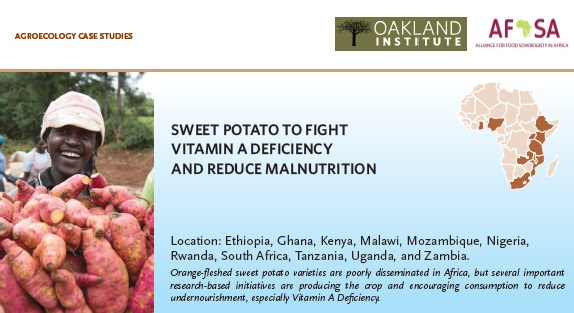
On 9 November 2015, the Oakland institute released a case study titled ‘Sweetpotato to fight vitamin A deficiency and reduce malnutrition’. The case study puts a spotlight on research-based initiatives that are producing orange-fleshed sweetpotato (OFSP) and encouraging its consumption to reduce undernourishment, especially vitamin A deficiency in sub-Saharan Africa. It also recognizes the role of the International Potato Center (CIP), whose team of scientists is taking a lead in sweetpotato research on the continent.
Specifically, the case study highlights efforts made in variety development for improved yield and increased pest and disease resistance; as well as research and activities to improve post-harvest handling, promote better agronomic practices and increase use and consumption of vitamin-A rich OFSP in Africa.
The study is one of thirty-three case studies that shed light on the tremendous success of agro-ecological agriculture across the African continent in the face of climate change, hunger and poverty.
“Released just two weeks ahead of the COP21 Conference in Paris, these case studies provide irrefutable facts and figures on how agricultural transformation – respectful of the farmers and the environment -can yield immense economic, social, and food security benefits while ensuring climate justice and restoring soils and the environment,” said Anuradha Mittal, Executive Director of the Oakland Institute.
“We are told over and over that Africa needs a new Green Revolution, more synthetic fertilizers, and genetically modified crops. These case studies debunk these myths and highlight the multiple benefits of agro-ecology, including affordable and sustainable ways to boost agricultural yields while increasing farmers’ incomes, food security, and resilience,” said Frederic Mousseau, Policy Director of the Oakland Institute, who coordinated the research for this project.
While agro-ecology promotes low use of external inputs, it is a very knowledge-intensive system. Transmission of this knowledge, adaptation to local contexts, and appropriation by farmers and government technicians, are essential steps for farmers and communities to reap the benefits of agro-ecology.
The case studies demonstrate how the expansion of agro-ecological practices will generate a rapid, fair and inclusive development that can be sustained for future generations. They showcase how farmers across the continent – including many women farmers – are driving their own development. They illustrate the process of innovation and experimentation that these farmers use to select techniques and practices that provide the best solution for them.
Commenting on the release, CIP Principal Scientist Dr. Jan Low, leader of the Sweetpotato for Profit and Health Initiative (SPHI), and the project manager of the Sweetpotato Action for Security and Health in Africa (SASHA) said, “It’s fantastic to see growing interest in OFSP. This case study will help to create greater awareness about the benefits of OFSP and our work in sub-Saharan Africa.”
The sweetpotato case study was produced by the Oakland Institute. It is co-published by the Oakland Institute and the Alliance for Food Sovereignty in Africa (AFSA). A full set of case studies can be found at www.oaklandinstitute.org and www.afsafrica.org.
